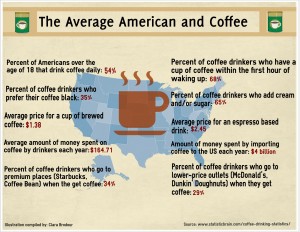Many people have a love/hate relationship with coffee. Some love the taste, some have to add so many sweeteners or flavors that it no longer resembles coffee anymore, and some just plain hate it. According to the National Coffee Association and estimated 68% of Americans in 2006 said they were hooked on coffee. Coffee can help students stay more alert if they spread its consumption throughout the day, but moderation is the key, according to the Harvard Medical School.
Drinking coffee is also known to uphold mental health longer in the elderly. A study exploring the relationship between coffee intake and mental decline showed that consuming no more than three cups of coffee daily helps reduce cognitive decline, stated the “European Journal of Clinical Nutrition” in Feb. 2007.
Coffee is an excellent source of dietary antioxidants. It is infused with powerful substances that help protect the body from free radicals and unstable molecules that damage healthy cells. Antioxidants have been linked to decreased risk for developing cancer and heart disease but can also prove harmful to the heart.
An article published in “Current Opinion in Clinical Nutrition and Metabolic Care” in Nov. 2007 noted that a study examining the relationship between coffee and risk of a heart attack provided strong evidence that caffeine in unfiltered coffee increases the risk of coronary heart disease.
A Finnish study of 19,000 people revealed those who drank four or more cups of coffee a day were twice as likely to develop rheumatoid arthritis, and researchers believe unknown ingredients, mainly in unfiltered coffee, could trigger the disease. Because caffeine acts as a diuretic, increasing the amount of calcium excreted in urine, it has been shown that post-menopausal women who drink two cups of coffee a day have a greater loss in bone density than those who don’t.
Although most people can drink two to four cups of coffee a day without experiencing harmful effects, consuming excess caffeine can cause several problems such as dehydration, headaches and dizziness.
Coffee is good as well as bad for students. In your younger years, coffee is good in moderation. But as people get older, it has more health risks than benefits. Although many enjoy the popular caffeinated drink without considering what it might be doing for their health, they should always stay attuned to how much coffee they are consuming daily.
In response to being informed of the pros and cons of consuming coffee, “I love coffee, it’s my morning wake-up call,” Jesse Powell, graphic design major said.


Leave a Reply